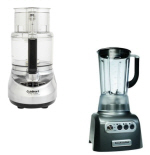|
EPI
Quick-Start Guide
 |
|
Home |
| The information
below provides the basics of how to get started if your dog has been
diagnosed with Exocrine Pancreatic Insufficiency (EPI). These basics
should help stabilize most EPI dogs. Once your dog is stable, you
can experiment with changes and additions. Make all changes slowly,
and make only one change at a time, so you'll know what helps and what
doesn't. Keep a journal. Success will follow. |
| |
|
| |
|
B. Fix food the right
way...
|

|
- Grind it
- So all parts of the food can come
in contact with enzymes
- If you can't grind kibble, pre-soaking
kibble in water until it's thoroughly mushy is OK, but some
kibbles are too hard to do this.
- Note: If your kibble
becomes entirely soft and mushy (no hard parts) after incubating
(see below), there is no need to grind or pre-mush.
|
- Mix it
- Room-temperature ground-up food
- Warm (not hot) water
- Enough water so end result is
mushy (or even like thick soup)
- Porcine enzyme powder (e.g.,
Pancreatin 6X, Viokase-V, etc.)
- Start with 1 tsp enzyme powder
to 1 cup of kibble
- Kibble is measured when whole
(before grinding)
- If feeding raw or canned, start
with slightly less enzymes
- Adjust enzyme quantity by 1/8
tsp every 3-5 days until your dog produces firm, wrinkled stools.
- Finding the right quantity is
trial-&-error.
- Some dogs need more enzymes;
some need less.
|

|

|
- Incubate it
- Soak (incubate) the mixture of ground-up
food, warm water, and enzymes for a minimum of 30 - 60 minutes
- Less time can cause mouth bleeding.
- End result should look like mush
(or even thick soup)
- If you incubate more than one meal
at a time, store the remainder covered in the fridge
- Warm prior to serving by floating
food bowl in larger bowl of very warm water
|
- Feed it
- Several small meals work best.
- No treats whatsoever!
It's hard but necessary.
- Your dog can only digest food
that's been incubated with enzymes.
- Untreated food will create more
health problems.
|
 |
|
| |
|
C.
Find out if your dog has SIBO or B12 deficiency...
|

|
- Ask your vet for the "Cobalamin/Folate"
test and consult with your vet for all treatment.
- B12 Deficiencies: Cobalamin (B12) results will tell if
your dog has a B12 deficiency
- Extremely serious if not treated
- Very treatable with regular
subcutaneous injections ("TAMU Protocol").
- Most oral supplements
don't work.
- Small Intestinal Bacterial
Overgrowth (SIBO): Folate results may help diagnose
SIBO.
- Can become entrenched if not
treated promptly
- Standard treatment is antibiotics
twice daily for 6 weeks
- Tylan powder (tylosin) is generally preferred
- Mild, with few side-effects
- Other antibiotics, such as metronidazole,
can also be effective
- If SIBO doesn't resolve,
antibiotics probably should continue
- Tylan is well tolerated and can
generally be taken long-term if necessary
- Note: SIBO often exists even when test
results are normal, so watch for symptoms. Common symptoms
are some (but usually not all) of the following...
- Tummy rumbles (loud stomach
gurgles)
- Gas, burping, wet burps, throwing
up (often brown liquid)
- Pica, stool-eating, grass-eating,
yellow stools
- Ravenous appetite or poor appetite
(one extreme or the other)
- Diarrhea
|
|
|
...and last but not least...
Join the K9-EPIGLOBAL Group and/or the EPI4DOGS Forum. It's one of the best things you can do for your dog.
|








